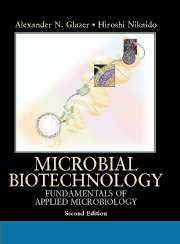Book contents
- Frontmatter
- Contents
- Preamble
- Acknowledgments
- 1 Microbial Diversity
- 2 Microbial Biotechnology: Scope, Techniques, Examples
- 3 Production of Proteins in Bacteria and Yeast
- 4 The World of “Omics”: Genomics, Transcriptomics, Proteomics, and Metabolomics
- 5 Recombinant and Synthetic Vaccines
- 6 Plant–Microbe Interactions
- 7 Bacillus thuringiensis (Bt) Toxins: Microbial Insecticides
- 8 Microbial Polysaccharides and Polyesters
- 9 Primary Metabolites: Organic Acids and Amino Acids
- 10 Secondary Metabolites: Antibiotics and More
- 11 Biocatalysis in Organic Chemistry
- 12 Biomass
- 13 Ethanol
- 14 Environmental Applications
- Index
- Plate section
13 - Ethanol
Published online by Cambridge University Press: 05 June 2012
- Frontmatter
- Contents
- Preamble
- Acknowledgments
- 1 Microbial Diversity
- 2 Microbial Biotechnology: Scope, Techniques, Examples
- 3 Production of Proteins in Bacteria and Yeast
- 4 The World of “Omics”: Genomics, Transcriptomics, Proteomics, and Metabolomics
- 5 Recombinant and Synthetic Vaccines
- 6 Plant–Microbe Interactions
- 7 Bacillus thuringiensis (Bt) Toxins: Microbial Insecticides
- 8 Microbial Polysaccharides and Polyesters
- 9 Primary Metabolites: Organic Acids and Amino Acids
- 10 Secondary Metabolites: Antibiotics and More
- 11 Biocatalysis in Organic Chemistry
- 12 Biomass
- 13 Ethanol
- 14 Environmental Applications
- Index
- Plate section
Summary
The potential quantity of ethanol that could be produced from cellulose is over an order of magnitude larger than that producible from corn. In contrast to the corn-to-ethanol conversion, the cellulose-to ethanol route involves little or no contribution to the greenhouse effect and has a clearly positive net energy balance (five times better). As a result of such considerations, microorganisms that metabolize cellulose have gained prominence in recent years.
– Demain, A. L., Newcomb, M., and Wu, J. H. D. (2005). Cellulase, clostridia, and ethanol. Microbiology and Molecular Biology Reviews, 69, 124–154.The preceding chapter described the major components of plant biomass – cellulose, hemicelluloses, and lignin – and their natural pathways of biodegradation. Many view the sugars locked up in cellulose and the hemicelluloses as an immense storehouse of renewable feedstocks for the fermentative production of fuel alcohol. This chapter begins with a discussion of the conversion of such sugars to ethanol and ends with an assessment of the future impact of fermentation alcohol as a fuel.
In microbiology, fermentation is defined as a metabolic process leading to the generation of ATP and in which degradation products of organic compounds serve as hydrogen donors as well as hydrogen acceptors. Oxygen is not a reactant in fermentation processes. In the words of Louis Pasteur, “[l]a fermentation est la vie sans l'air” – fermentation is life without air. The long history of brewing and wine making has produced highly refined technologies for large-scale fermentation and for the recovery of ethanol.
- Type
- Chapter
- Information
- Microbial BiotechnologyFundamentals of Applied Microbiology, pp. 458 - 486Publisher: Cambridge University PressPrint publication year: 2007
- 3
- Cited by



